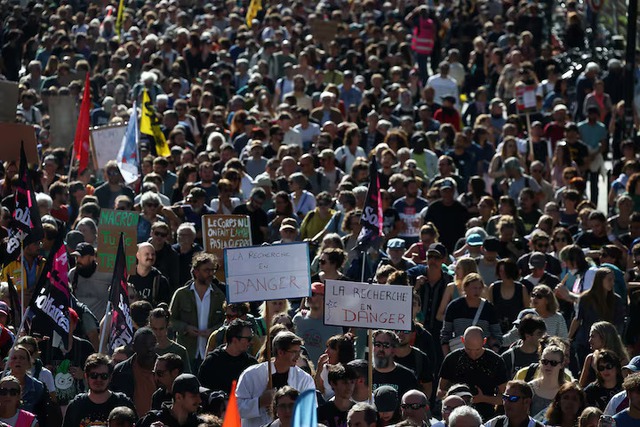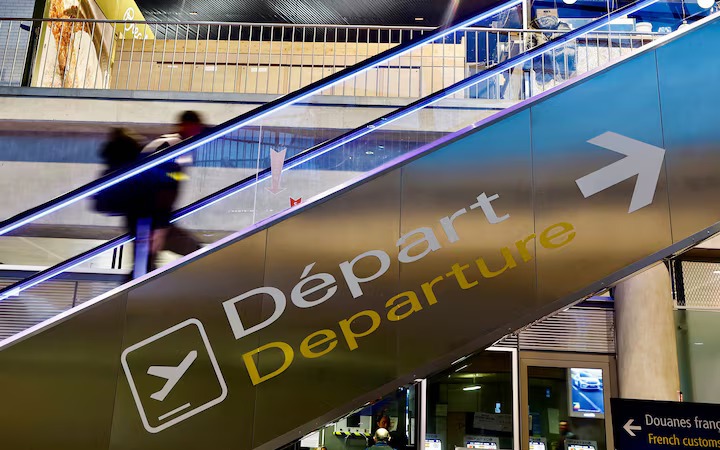
French unions strike against austerity, pressuring Macron
PARIS -- Hundreds of thousands took part in anti-austerity protests across France on Thursday, urging President Emmanuel Macron and his new Prime Minister Sebastien Lecornu to acknowledge their anger and scrap looming budget cuts.

A general view shows protesters holding placards during a demonstration in Nantes as part of a day of nationwide strikes and protests against the government and cuts in the next budget, with supporters of the 'Bloquons Tout' (Let's Block Everything) movement, France, September 18. The slogan reads 'Research in danger'. Photo: Reuters
Teachers, train drivers, pharmacists and hospital staff were among those who went on strike as part of the day of protests, while teenagers blocked dozens of high schools for hours.
Protesters and unions called for the previous government's fiscal plans to be scrapped, for more spending on public services, higher taxes on the wealthy and for the reversal of an unpopular change making people work longer to get a pension.
"The anger is immense, and so is the determination. My message to Mr. Lecornu today is this: it's the streets that must decide the budget," said Sophie Binet, head of the CGT union.
The CGT said one million people took part in the strikes and protests. Authorities estimated the number of protesters at about half that number.
There were some clashes on the margins of the rallies but the level of violence was not as high as Interior minister Bruno Retailleau had feared.
"I would like to emphasize that in almost all cases, marches and demonstrations took place under favorable conditions," he said during a briefing held shortly after the end of the Paris rally.
Unions want to pressure government on budget
Macron's new prime minister is scrambling to put together a budget for next year, as well as a new government.
On a post on X, he vowed to meet the unions again "in the coming days, adding, "The demands made by the union representatives and echoed by demonstrators in the marches are at the heart of the consultations I have initiated."
Lecornu and Macron are under pressure on one side from protesters and left-wing parties opposed to budget cuts and, on the other, from investors concerned about the deficit in the euro zone's second-largest economy.
Parliament is deeply divided and none of its three main groups has a majority.
"This is a warning, a clear warning to Sebastien Lecornu," said Marylise Leon, the head of the CFDT, France's largest union.
"We want a socially fair budget."
Protests hit schools, trains
One in three primary school teachers was on strike nationwide on Thursday, and nearly one in two walked off the job in Paris, the FSU-SNUipp union said.
Regional trains were heavily affected, while most of the country's high-speed TGV train lines worked, officials said.
Protesters gathered to slow down traffic on a highway near the southeastern city of Toulon.
In Paris, police on several occasions threw teargas to disperse troublemakers dressed in black who hurled beer cans and stones at them.
Police also stepped in to stop people targeting banks.
There were brief clashes on the margins of some of the other protests as well, including in Nantes, and in Lyon, where French media said three people were injured.
Workers angry over fiscal plans
More than 180 people have been arrested, the interior ministry said.
Some 80,000 police and gendarmes were set to be deployed throughout the day, including riot units, drones and armored vehicles.
France's budget deficit last year was close to double the EU's 3% ceiling but much as he wants to reduce that, Lecornu - reliant on other parties to push through legislation - will face a battle to gather parliamentary support for a budget for 2026.
Lecornu's predecessor, Francois Bayrou, was ousted by parliament last week over his plan for a 44 billion euro budget squeeze.
The new prime minister has not yet said what he will do with Bayrou's plans, but has signaled a willingness to compromise.
Reuters
Link nội dung: https://news.tuoitre.vn/french-unions-strike-against-austerity-pressuring-macron-103250919093839942.htm
